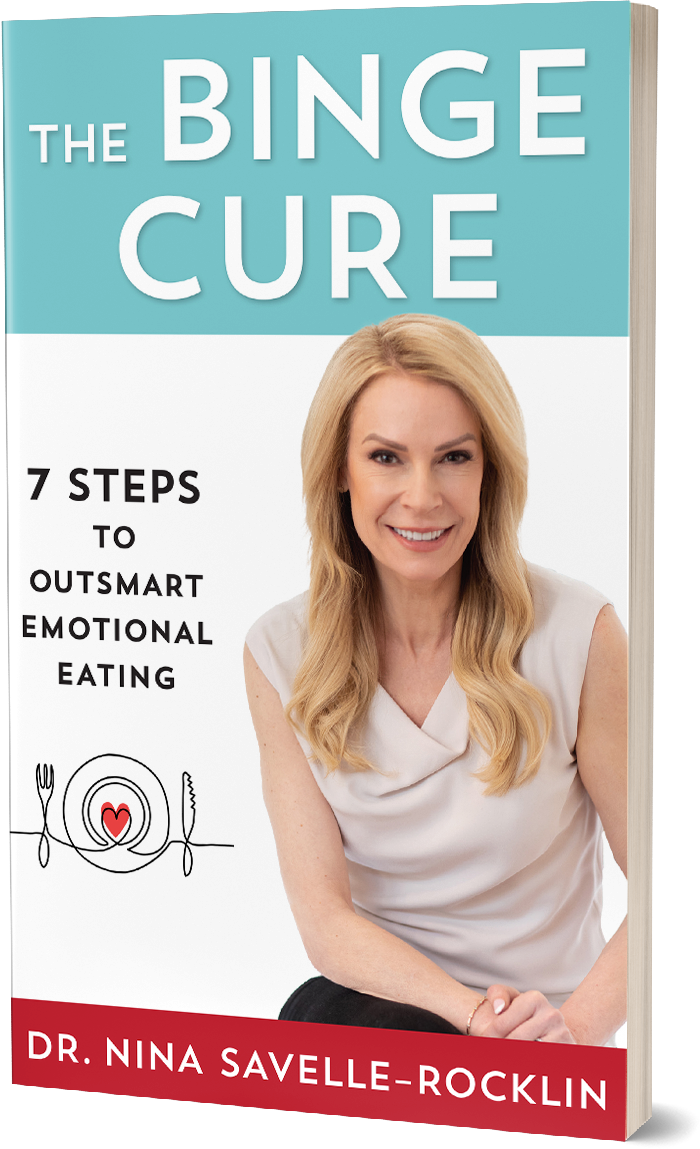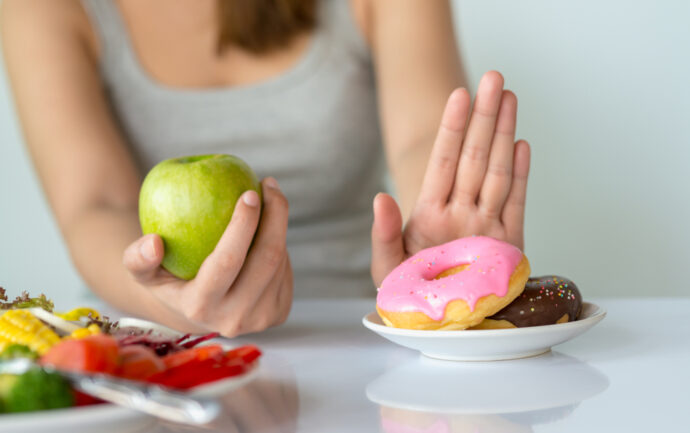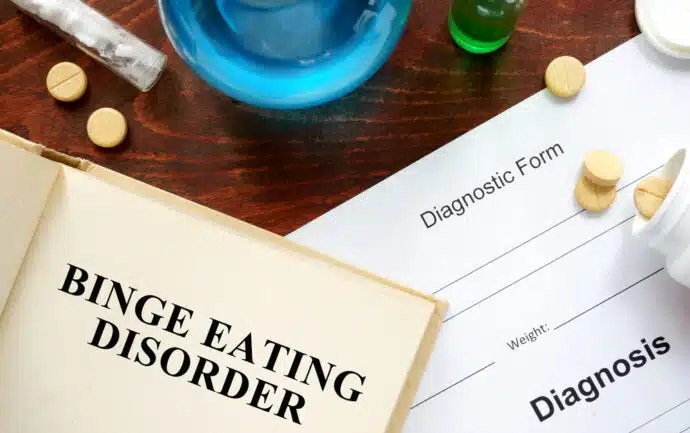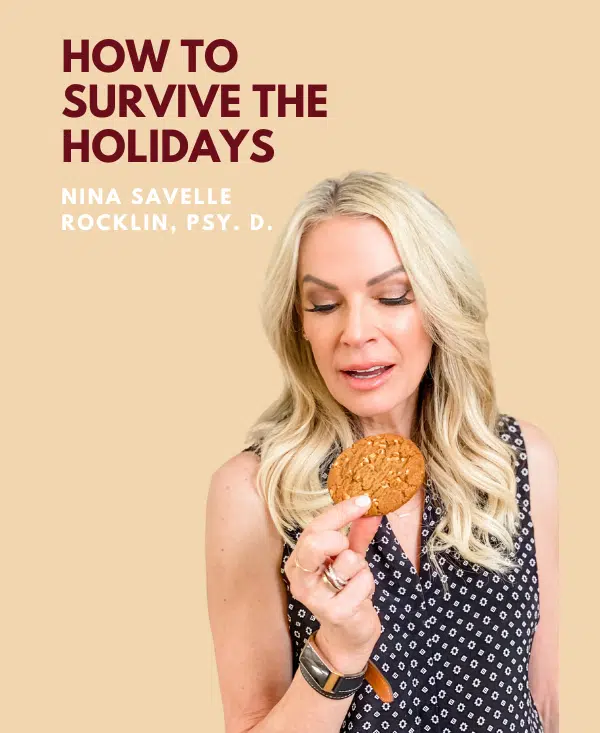Dr. Nina Savelle-Rocklin
Binge Eating vs Emotional Eating
Table of Contents
- What is Emotional Eating?
- Is Binge Eating the same as Emotional eating?
- What is Binge eating?
- How do you know it’s Binge Eating?
- Should you be worried about emotional eating?
- Binge eating vs Emotional Eating?
- Hope for Emotional Eating
- FAQs
Annabelle said she’d binged on cookies after a tough day at work. She’d eaten six cookies.
Bethany also reported bingeing on cookies. How many cookies did she consume in that binge? A whole box of Oreos and part of a second. At least sixty cookies.
Although both women thought they’d binged, Annabelle had done some emotional eating Bethany was the one who actually binged.
Binge eating and emotional eating are terms that are often used interchangeably. Let’s look at emotional eating vs binge eating to understand what these two terms actually stand for and why you should care about the distinction.
Let’s start with what emotional eating is.

Table of Contents
- What is Emotional Eating?
- Is Binge Eating the same as Emotional eating?
- What is Binge eating?
- How do you know it’s Binge Eating?
- Should you be worried about emotional eating?
- Binge eating vs Emotional Eating?
- Hope for Emotional Eating
- FAQs
What is Emotional Eating?
To have a clear grasp of the distinction between binge eating vs emotional eating, let us first define what they are. Emotional eating as the term suggests, is eating in response to your emotions. Sometimes, we want to avoid our emotions or we don’t know how to respond to them, so we turn to food.
Emotional eating means eating to change the way we emotionally feel, rather than to assuage physical hunger. For instance:
Have you ever felt a sudden urge to eat ice cream after a disappointment or a breakup? (We see that happening in movies all the time). It’s because we often seek comfort when we’re upset, sad and feel lonely. Creamy foods like ice cream are associated with comfort and soothing.
This is just one example of emotional eating. The reasons behind emotional eating go way beyond this. At night, you might turn to food because you feel bored or lonely. You might suddenly want to eat while reading a book or watching a TV show. You may wander into the kitchen after dinner, even though you’re not hungry.
In each case, there is a situational trigger, and food is a way of coping. If you’re lonely at night, food can symbolically fill a void. Reading or watching TV can activate uncomfortable feelings associated with the book or TV show. Eating can give you something to do other than ‘be” with yourself and potentially unpleasant thoughts and emotions.
It feels as if you’re triggered by food, but you’re actually triggered by some thought, situation, conflict, or emotion.
Emotional eating is not a clinically diagnosable eating disorder. It’s an umbrella term that refers to using food for reasons other than because we are physically hungry. If you eat when you’re stressed, bored, angry, or upset, that is a sign of emotional eating.
Is Binge Eating the same as Emotional eating?
Binge eating is a clinically diagnosable and treatable eating disorder. Binge eating disorder is the most common eating disorder, impacting nearly three million people in the United States (ANAD website) alone.
The true number is likely much higher since many people wpoph0–o struggle with binge eating don’t realize they have a treatable condition. They often think they lack willpower or control or think they’re food addicts.
What is Binge eating?
Binge eating is also a way of coping with emotions and internal conflicts but it involves a greater amount of food, along with more self-recrimination and shame. People binge for many reasons, including denying, avoiding, or enacting painful or upsetting thoughts, emotions, and conflicts.
Food is used as a source of comfort, distraction, or to numb or express pain, anger, anxiety, or anything uncomfortable. The clinical diagnosis of bingeing means the behavior occurs, on average, at least once a week for a minimum of three months (it’s usually more like years). People who binge often experience high levels of shame, feelings of guilt, embarrassment, and disgust.
How do you know it’s Binge Eating?
Here are a few signs you can look for to know if you’re binge eating:
- Eating a large amount of food in a short period of time
- Eating past full, sometimes even to the point of physical pain
- You can’t stop thinking about food.
- You avoid social gatherings because you can’t trust yourself around food.
- Sometimes it doesn’t matter what you’re eating; you just can’t stop
- You feel shame, guilt, and remorse afterward
Should you be worried about emotional eating?
While it’s okay to rely on food once in a while for comfort or distraction, if it’s a habitual response and causes mental anguish, it’s a problem. If you frequently turn to food without even savouring the taste and you often think something along the lines of, “What’s wrong with me? I can’t stop!” then your behavior needs your attention.
It’s important to know that food is not the problem. It’s the solution to the true problem, which is whatever is bothering or upsetting you.
Ask yourself “What am I feeling right now?” Is it anger? Is it sadness? Is it loneliness?
The only way to get rid of emotional eating is to find new ways of responding to yourself instead of turning to food.
Binge eating vs Emotional Eating?
By now, you have a good idea on the difference between binge eating vs emotional eating. You know that “emotional eating” is an umbrella term for any problematic eating that relates to emotions. When food is the medium to cope with the difficulties of life, emotional eating comes into play. Binge eating disorder is a form of emotional eating.
Yet, emotional eating may or may not be classified as binge eating disorder, which is a specific and extreme form of emotional eating.
Hope for Emotional Eating
If you struggle with food, you may feel hopeless, embarrassed, and worried that you’re never going to feel “normal” around food. It’s important to know that you learned to respond to yourself by using food to deal with upsetting emotions, or even as a way of celebrating.
It’s a learned coping strategy and the good news is that you can learn a new way. When you find new ways to identify why you’re eating, instead of focusing on what you’re eating, and when you create healthier responses to your emotions, you’ll stop emotionally eating for good.
FAQs
Below are some of the most Frequently Asked Questions on Binge eating vs emotional eating that will help give you further knowledge an understanding on the topic.
I usually tend to binge during holidays. Should I be worried about it?
We often mistake bingeing for overeating. Everyone overeats on occasion but bingeing is a specific behavior that is compulsive and associated with shame, secrecy, and self-hatred.
What is the first step to get rid of emotional eating?
Here are 3 things you can start doing today:
1) Identify the underlying emotions
2) Express those emotions in words
3) Respond to yourself compassionately (the way you might talk to a friend, child, or loved one)
Should I seek clinical help for emotional eating?
If you’re thinking about food all the time, eating when you’re not hungry, often to the point of being way beyond full, and if you feel shame and guilt about your relationship with food, you can benefit from professional help. Emotional eating, whether it is binge eating, stress eating, or any kind of disordered eating that causes you distress, needs your attention.
A professional therapist can help you find new ways to respond to yourself and strengthen your ability to cope with the impact of life’s stressors. In addition to helping you break free from emotional eating, therapy can help you live your happiest, truest life.
Ready to transform your relationship with food?
Join Dr. Nina's newsletter and receive:
• Expert tips on overcoming emotional eating
• Strategies for sustainable weight loss
• Exclusive content not found anywhere else
Don't miss out on the latest breakthroughs in binge eating!
The Author

Dr. Nina Savelle-Rocklin is a renowned author and podcast host and one of the nation’s leading psychoanalysts known for the psychology of eating. Her signature message of, “It’s not what you’re eating, it’s what’s eating ‘at’ you” has resonated with hundreds of thousands of listeners from around the globe in 40 countries. As founder of The Binge Cure Method, she guides emotional eaters to create lasting food freedom so they can take back control of their lives and feel good in their bodies.
Related Blogs
















